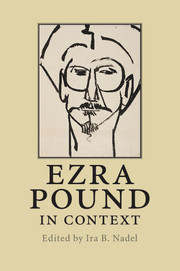Book contents
- Frontmatter
- Contents
- Notes on contributors
- Acknowledgements
- Chronology
- List of abbreviations and note on references to The Cantos
- Introduction
- Part I Biography and works
- Part II Historical and cultural context
- 16 The classics
- 17 Provençal and the troubadours
- 18 Dante and early Italian poetry
- 19 America
- 20 Venice
- 21 London
- 22 Paris
- 23 Rapallo and Rome
- 24 Pisa
- 25 Imagism
- 26 Vorticism
- 27 Music
- 28 Visual arts
- 29 Confucius
- 30 The Orient
- 31 Little magazines
- 32 Publishing and publishers
- 33 Modernism
- 34 Fascism
- 35 Anti-Semitism
- 36 Gender and sexuality
- 37 Race
- 38 Travel
- Part III Critical reception
- Further reading
- Index
20 - Venice
Published online by Cambridge University Press: 05 July 2014
- Frontmatter
- Contents
- Notes on contributors
- Acknowledgements
- Chronology
- List of abbreviations and note on references to The Cantos
- Introduction
- Part I Biography and works
- Part II Historical and cultural context
- 16 The classics
- 17 Provençal and the troubadours
- 18 Dante and early Italian poetry
- 19 America
- 20 Venice
- 21 London
- 22 Paris
- 23 Rapallo and Rome
- 24 Pisa
- 25 Imagism
- 26 Vorticism
- 27 Music
- 28 Visual arts
- 29 Confucius
- 30 The Orient
- 31 Little magazines
- 32 Publishing and publishers
- 33 Modernism
- 34 Fascism
- 35 Anti-Semitism
- 36 Gender and sexuality
- 37 Race
- 38 Travel
- Part III Critical reception
- Further reading
- Index
Summary
From his youth until his death, Ezra Pound found in Venice not only a hospitable environment for writing and living, but a paradigm for the design of The Cantos. Merely to cross its bridges, admire its legion of palazzi, or navigate its lagoons is to engage in Venice's brilliant light, eerie shadows, merger of water and architecture, intricate history, and unique blend of vibrancy and decay. As the center of a 1200-year long maritime power, with its unusual republican style of government and international commerce, La Serenissima, of course, has had its share of writers from Marco Polo (1256–1324) and Paolo Sarpi (1552–1623) to Carlo Goldoni (1707–93) and Gabriele D’Annunzio (1863–1938), figures who have distinguished it as among the world's most intriguing cities. And the number of visiting writers it has fascinated is great and ever-growing, from Petrarch (1304–74) to Joseph Brodsky (1940–96). Even with this rich legacy, to consider Venice as Pound did, especially in his poetry, is not only to rediscover it through the imagination of an exiled American modernist, but to appreciate how Pound's own art, despite its difficulties, is immediate and vital.
Pound's first visit to Venice occurred at age twelve with his Aunt Frank in 1898. He intended “to return” (PDD, 6). And return he did, at least six more times before he was thirty-five (PDD, 6): in 1902, with Aunt Frank and his parents; in 1908, after his dismissal from Wabash College, when he published there A Lume Spento, his first volume of poems, and composed his “Venetian sketch-book – ‘San Trovaso’ –” (CEP, 55); in March 1910, meeting with Olivia and Dorothy Shakespear; in 1911; in spring 1913, when he met with H.D., her parents, and her husband Richard Aldington (SL, 19–20); and in 1920, when he began writing “Indiscretions or, Une Revue De Deux Mondes,” a rare foray for Pound into memoir.
- Type
- Chapter
- Information
- Ezra Pound in Context , pp. 221 - 230Publisher: Cambridge University PressPrint publication year: 2010



